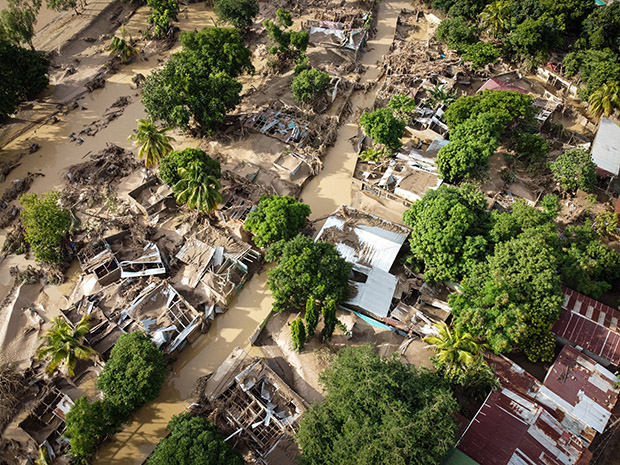
Views of the damage done by hurricanes Eta and Iota in Chamelecón, San Pedro Sula, Honduras in November 2020. Many houses were washed away, leaving rubble or nothing, and many were badly damaged. As the flooding came unexpectedly fast many people lost all their belongings including their furniture. Photo: Sean Hawkey
Around the world, people are feeling the effects of climate change. In 2019, weather-related disasters displaced nearly 24 million people globally. That number is likely to increase, as climate change contributes to more intense and more frequent disasters, like hurricanes or wildfires.
Other climate impacts are being felt more gradually—such as temperature increases, changes in rainfall patterns and saltwater intrusion of farmland or drinking water. While these “slow-onset” impacts may not get the press or social media attention of massive storms or wildfires, in many agricultural communities where CWS works, these are the changes that people feel in their daily lives. And for coastal communities and island nations facing sea-level rise, the threat is becoming existential.
Both science and human experience tell us that slow-onset climate change will affect, and in some cases devastate, vulnerable communities in the future. It already impacts how, when, and where we move—and, in some cases, whether moving out of harm’s way is even an option. Even amid the many urgent migration issues that we face, it is only prudent that we plan now for humane responses, as the need for them will only grow.
The science, of course, also tells us that urgently reducing greenhouse gas emissions is essential to avoid the most catastrophic impacts of climate change. Much more needs to be done so communities feeling its effects have access to the information, technology and financial resources needed to adapt and voice their needs in resilience planning.
Despite these challenges, we still have a window to act. Projection models, such as those used by the World Bank, suggest that significantly reducing greenhouse gases, coupled with robust support to local adaptation, could reduce the number of climate-displaced persons by a factor of five. Still, the same report projects that in best case scenarios for climate action, 31 million people in Africa, Latin America and South Asia will be displaced internally by slow-onset climate change, by the year 2050.
As an organization rooted in faith, Church World Service believes that all people deserve to lead lives of dignity, wherever we find ourselves. Creation is sacred, and we are called to responsibly steward its gifts to us. With this in mind, CWS is gathering field evidence on where and how climate change affects human mobility, starting in five countries where CWS supports community resilience and climate adaptation efforts.
Now is the time to plan for the impacts of climate on migration. Last week, President Biden issued an executive order that commissioned an official report, due this coming August, on how climate change impacts forced migration, internal displacement and planned relocation. Last year, the U.S. Government Accountability Office (GAO) recommended a pilot program to help at-risk coastal communities in the United States who wish to assess relocation among climate resilience options. These could be important—perhaps even historic—first steps toward ensuring that people who face extreme climate hazards can move safely out of harm’s way.
The accelerating climate crisis requires a truly global response. The ways that we address climate change and migration could expand livelihood opportunities for people on the move, and for their families back home. Failing to respond, however, will only lead to new threats: forced displacement, migration into vulnerability or new disaster risks, or people becoming trapped in fragile and unsustainable locations. For all these reasons, CWS joins like-minded and like-hearted people worldwide, in calling for, and contributing to, the safety, dignity and human rights of those whose mobility is impacted by climate change.
—Andrew Fuys is Senior Director, Global Migration, at Church World Service
